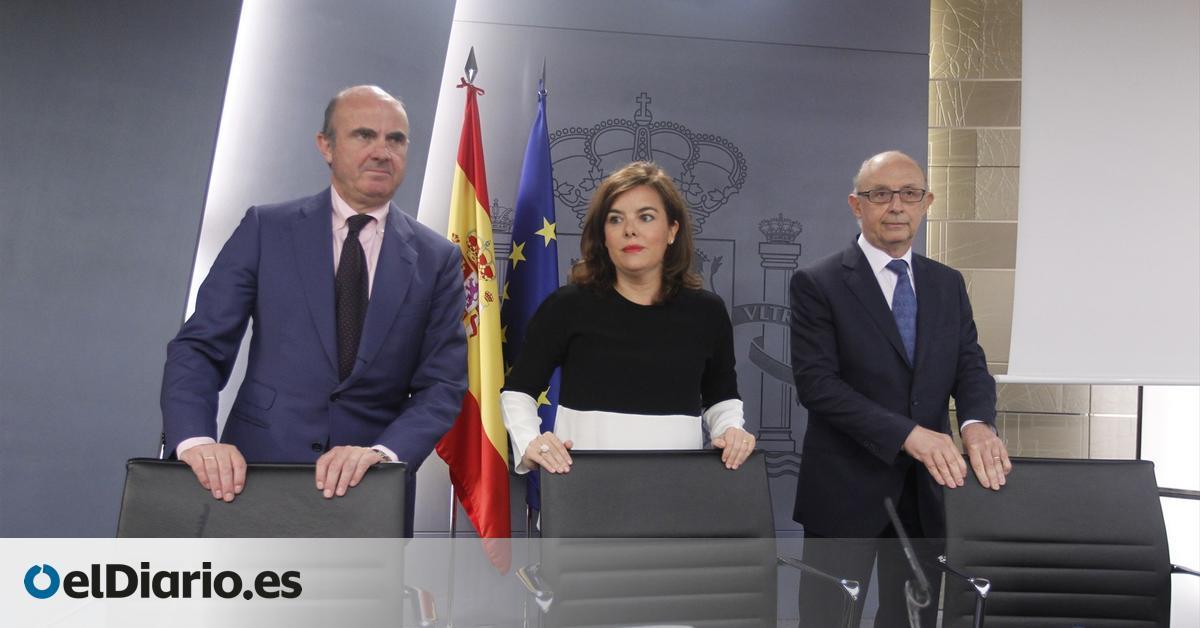
The latest judicial setback to the economic management of the Popular Party (PP) governments chaired by Mariano Rajoy during the financial crisis aggravates the millionaire hole that they left behind as inheritances to the following executives and to the public coffers. This Thursday, the Constitutional Court decided to overturn one of the measures that Cristóbal Montoro took as Minister of Finance in 2016 to meet the deficit objectives (the imbalance between the income and expenses of the State): limit the deductions of large companies.
The total amount that the new coalition Government will have to refund to the companies that demand these tax increases, as provided for in the Constitutional Court ruling, is unknown. “We have to analyze the resolution,” say sources from the current Ministry of Finance of the first vice president, María Jesús Montero. But a first approximation, if it is assumed that all companies have claimed, suggests that it could be around 7,000 million, if one takes into account the 1,000 million that the Treasury recognized that was extraordinarily earned with the Corporate Tax in 2016, and multiplies by the 7 years that this measure has been in force, from 2016 to 2023.
Approximately, it would be 0.5% of the GDP (Gross Domestic Product), when the objective is to return the deficit to 3%, as required by the new fiscal rules of the European Union (EU), from this 2024.
It was the National Court that questioned this rule and took the matter to the Constitutional Court, understanding that a Royal Decree-Law could not regulate “essential elements of the Corporate Tax”, which could only be transformed through a rule with a higher rank. Of law. A similar reason that led the same court to annul another Montoro tax reform that same year: the advance payment of Corporate Tax.
Another of the great measures of Cristóbal Montoro and Mariano Rajoy’s executive that overthrew the Constitutional Court was the 2012 tax amnesty, which according to Treasury data, around 30,000 Spaniards took advantage of. In that case, the plenary session also declared its unconstitutionality but limited the effects to those who had not regularized their situation to preserve “legal security.”
The bailout of the banks that was not going to cost a single euro
To the amount that the recent ruling of the Constitutional Court costs, we must add other judicial defeats in Spain and in the EU of decisions made by Rajoy and his main economic officials, such as Montoro or Luis de Guindos, who is today vice president of the European Central Bank ( ECB). The latter and the vice president at that time, Soraya Sáenz de Santamaría, announced in 2012 the historic bailout of the banks “that would not cost a single euro” of public money, as they claimed at the time. Finally, it implied close to 50,000 million in losses for the State, as recorded by the Bank of Spain.
In 2022, also due to the management of the rescue, the previous coalition government had to increase our country’s public debt by another 35 billion. In this case, due to the fiasco of Sareb, known as the “bad bank”, as demanded by Eurostat (the EU statistics institution). The Asset Management Company from Bank Restructuring (Sareb) was designed to assume the toxic brick of the rescued banks, under private control. However, it failed and since 2022 it has remained in public hands.
Contributing to this failure was the controversial management of contracts with third parties—the so-called servicers— to dispose of that real estate portfolio and a derivative to cover theoretical increases in interest rates that resulted in losses of 3,000 million. That swap He was hired during the presidency of Belén Romana, highly trusted by Luis de Guindos and today a director of Banco Santander.
Model 720
Another fiasco from the Rajoy period also dates back to 2012, which represents another millionaire loss for public accounts. It was also the work of Cristóbal Montoro, the minister who broke the record for tenure in the Treasury portfolio and who in 2010, when he was in the opposition, said “let Spain fall, we will lift it up” while the country was facing the bailout for the sovereign debt crisis.
At the beginning of 2022, the Court of Justice of the European Union (CJEU) overturned the “disproportionate” sanctioning regime that Montoro imposed a decade ago to reveal the existence of assets hidden abroad: the so-called model 720.
This mechanism, which has allowed assets worth 225.2 billion to emerge abroad, and which the European Commission required Spain to modify in 2017, carried with it the threat of heavy fines for the omission or lack of data, was launched in parallel to the controversy tax amnesty.
On the one hand, a candy was offered to fraudsters who, through the so-called model 750, regularized their situation with that measure of grace, which was later annulled by the Constitutional Court without consequences for their beneficiaries, who were able to surface hidden assets by paying a meager 3%.
On the other hand, model 720 imposed harsh penalties on taxpayers who concealed or declared assets abroad after the deadline with a value greater than 50,000 euros.
With this sanctioning regime, “extremely repressive”, according to the CJEU, undeclared assets and rights were considered unjustified capital gains, with sanctions of 150% of their value and without the possibility of prescription. In 2023, the Treasury recognized the “absolute nullity” of the sanctions, and opened the door to claiming their refund, which could reach up to 70 million in total.
The VAT of the CCAA
Two years ago, the Treasury also resolved another “inherited problem” from the Rajoy Government, by compensating the autonomous communities with 3,000 million for the VAT that they stopped receiving for the 2017 financial year.
Montoro then implemented a new electronic system (the Immediate Information Supply or SII) to manage the collection of this tax, which meant that the autonomies ended up paying 11 months of VAT instead of 12 for that year. Meanwhile, the Government of Pedro Sánchez did not provide a solution to the problem, by conditioning the return of that money to having approved Budgets, several autonomous communities appealed to the Supreme Court. Finally, in 2021, the High Court recognized the right to be compensated in Castilla y León and Galicia, both governed by the PP, opening the door to a flood of claims.
As a prosecutor who knows the insides of the Administration graphically summarized, Montoro “made the animal, but he balanced the accounts and now someone else is eating the brown one.”
Hydroelectric canon
Another similar ruling was the one handed down by the Supreme Court on the hydroelectric fee that the PP Government approved, again, in 2012, although it was not implemented until 2015. In April 2021, the Supreme Court agreed with the electricity companies in a decision that has forced the companies in the sector to return 1,907.67 million for the collection of that fee between 2013 and 2020. That amount was refunded to the companies in the middle of the electricity price crisis and was charged to the public deficit, through a agreement adopted by the Council of Ministers at the end of 2021 to authorize the application of the Contingency Fund.
The fee taxes the turnover for the production of the largest plants at 25.5%. It was launched by the then Minister of Industry, José Manuel Soria, to address (it was said at the time) the multi-million dollar tariff deficit of the electricity system, although the funds go to the Public Treasury.
When the Supreme Court ruling was issued, the return was estimated at 500 million, and later, at 1,400 million, but the final figure was much higher. The High Court did not annul the fee as such, but it did annul its retroactive nature (the years 2013 and 2014) and decreed that the Hydrographic Confederations (in charge of collecting it) cannot claim it from those concessions whose owners did not give their express approval, which It didn’t happen.
Beaver and highways
One of the most controversial holes related to the energy sector also emanates from another Supreme Court ruling: the payment to the bank of the compensation of 1,350 million euros that the entities advanced to ACS for the failed Castor gas warehouse. It is the money that the High Court forced the State to pay at the end of 2020 to Santander and CaixaBank after canceling the payments, through the gas bill, of the advance they made to the promoter of the warehouse for its closure in 2014.
The compensation comes from the resolution to award the silo in 2008, with the socialist Miguel Sebastián as Minister of Industry, which included a clause by which in the event of termination of the concession, ACS would have the right to receive compensation even in the event of “ fraud or negligence attributable to the concessionaire company.”
But the amount ended up being assumed by the State because, when it was decided to hibernate the facility in 2014, after a succession of earthquakes, the then Minister José Manuel Soria hurriedly approved a Royal Decree-Law to compensate ACS by charging its cost, with interest, to the gas rate. The decree was declared unconstitutional in 2017, which left the payments that until then had been made to the banks without coverage.
Added to the Beaver hole are the million-dollar claims in arbitration courts from investors affected by the cuts to renewables, which reached 10,000 million euros, of which payment of 6,100 million has so far been avoided, according to the Ministry for the Ecological Transition; or the more than 500 million that had to be returned to the electricity companies for the social bonus in force between 2013 and 2016, although in this case the amount was paid for by electricity consumers. And the bill for the rescue of the toll highways bankrupted by the 2008 financial crisis and currently in the hands of the State is yet to be determined, which “will not cost the citizen a euro,” according to what the then Minister of Public Works, Ana, said at the end of 2013. Shepherd.
The previous coalition Government calculated at the end of 2021 a provisional cost of 1,021 million, an estimate that is subject to a long administrative and judicial process, resulting from subtracting from the cost of the works and expropriations the investments that the infrastructure still requires. , compensation paid for land expropriations and the amounts necessary for the Administration to take charge of future payments.
Those more than 1,000 million are a downward calculation, given that the Government itself recognized that the final bill could be up to 3,305 million. Creditors, investment funds and construction companies, assure that compensation could amount to 4.5 billion. Here PSOE and PP also blame each other respectively for the fiasco. The socialists attribute this to the privatization model of José María Aznar, responsible for promoting these infrastructures. And the popular ones, to the lack of zeal of the Government of José Luis Rodríguez Zapatero when it came to suing in court for the extra costs of the expropriated land, which benefited families such as the Francos, the Serrano Suñer or the Abelló.
Source: www.eldiario.es

